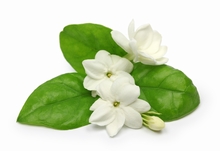Jasmine: The Tragic Romantic Story Hidden Behind the Philippines' Floral Emblem
October 24, 2016

Hello everyone, I'm Naho, a girl who would love to travel abroad this summer. Recently I've been flipping through the pages of foreign literature for English learning purposes, and I found myself particularly drawn to love stories - women do dream about Romance after all, I guess. Known to many for its elegance, the jasmine is the floral emblem of the Philippines. What people do not see behind those pearly petals, however, is the legacy of a great romantic story.
A Hidden Tale of Fruitless Love
The floral emblem of the Philippines is what we know as the Arabian Jasmine. Filipinos call it "Sumpa Kita", 'a promise of endless love' in the Tagalog language.
Once upon a time in the Spanish Philippines, two young people from feuding tribes fell in love with each other. Such a relationship was strictly forbidden, for they were supposed to be enemies. Nevertheless, the flame of love was not to be stopped despite everything that came against it, and the pair continued the affair, secretly meeting up in the evenings of full moon, stretching their love into the passage of time--until the war took their futures away.
The boy had lost his life and the girl, living on sadness day after day, was no longer able to maintain her health conditions. Before long, she too passed away, as though following him to the grave. The two were buried together where a beautiful white flower of jasmine then blossomed, whispering "sumpa kita" in the wind. That is where the name of the flower came from, or at least, so the story goes.
Are Filipinos More Romantic?
Living in a country where such a romantic story became widespread, do people of the Philippines tend to be passionate romantics? It is said that although individual differences must be taken into consideration, love for the family is highly valued among Filipinos, and it is common for them to sacrifice their own interests for the benefits of their parents.
Likewise, many Filipinos are believed to be extremely devoted and loyal to their partners. However, with their all-or-nothing attitude towards romantic relationships, it is rumoured that they are also prone to jealousy and disputes.
The Filipino psychology is rooted in and built upon the core values of collaboration and mutual help, and that is why its people tend to be openhearted and friendly towards foreigners. If you plan to travel to the Philippines, I would recommend that you embrace the local community with an open mindset.
The Secret Benefits of Drinking Jasmine Tea
Jasmine tea is popular in Japan for its pleasant aroma, which combines the freshness of green tea leaves with the sweet fragrance of jasmines. It's widely assumed that adding in the corolla of the flower while brewing the tea leaves brings out the best of the mixed aroma.
People from many countries love jasmine tea for the richness of its fragrance and the relaxing effect that comes with it. In China, people call jasmine tea Mo Li Hua Cha (茉莉花茶) with affection, some even believe that it is the secret to living longer and healthier. In fact, the aroma of jasmine tea contains benzyl acetate, an organic compound which could relieve stress and make the brain more active. It might be a good idea, therefore, to enjoy some jasmine tea before an intensive study session or a demanding presentation.
For those who would like to know how to say 'jasmine tea' in Japanese, it is jasumin cha (ジャスミン茶). A tip to memorise this word is simply to add 'cha' (tea) to 'jasumin', which sounds very similar to 'jasmine', the English equivalent.
Related Services
| << Studying Foreign Languages Through NHK's Language Programs | Exploring the Language of the East European Country Croatia and Croatian Translation >> |
To Contact Us Regarding Our Translation Services
For urgent needs, call:
+81-3-5730-6133
